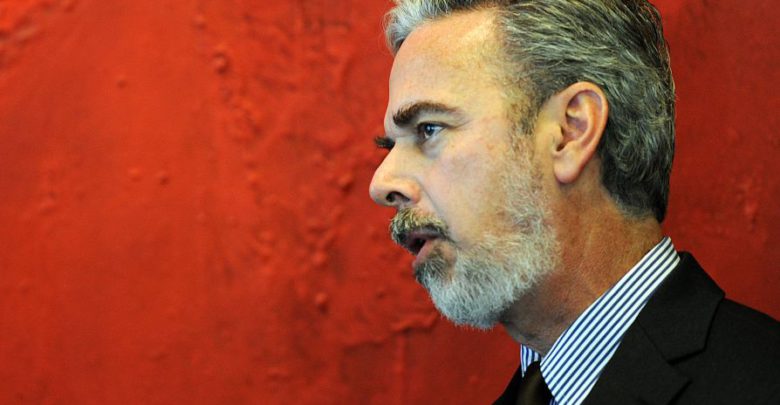Egypt reopens sectors, economy expected to grow
In a phone interview with ANBA, former Brazilian FM and current ambassador to Cairo, Antonio Patriota, talked about Egypt’s good economic outlook, despite the difficulties faced in the pandemic. Relations with Brazil are mature and stable, he says.

Egypt is reopening its economic activities, anddespite the crisis the world experiences due to COVID-19, the country is expected to finish this fiscal year and the next posting growth. The World Bank’s forecast that Egyptian Gross Domestic Product (GDP) will grow by 2.8% in the 12 months through June 30 and 2.1% in the next was commented on by Brazil’s ambassador to Cairo and former Brazilian Foreign minister Antonio Patriota.
“The Egyptian economy is one of the few that are still expected to see a positive growth,” the diplomat said in a phone interview from Cairo with ANBA. “That is due to the diversity of its economy, as well as the support given by the IMF, as well as the economic management that is considered professional by the financial market, operators and investors,” he said. The Arab country carried out an economic recovery plan supported by the International Monetary Fund.
Patriota pointed out that the Egyptian government poured USD 6 billion in social welfare measures due to COVID-19, including measures for the industry, energy cheapening, and tax exemption. “I believe that these had a beneficial effect in keeping the economy going,” the ambassador said. The country does not rely on just one sector, as it occurs in the Gulf countries, Patriota says.
The diplomat believes, however, that Egypt is not entirely free of challenges. They include, he says, the increase in poverty and unemployment, the high proportion of healthcare workers with COVID-19, and geopolitical issues in the surrounding countries, such as the difficulties in Libya and Ethiopia. “It ends up creating a geopolitical tension that can impact the economy and foreign trade,” he says.
Egypt said it will resume international flights and allow foreign tourists to enter some regions on July 1, following the reopening of domestic tourism in mid-May. The permitted occupancy of hotels is 50%. Other measures will be relaxed in early July, involving other sectors, always with certain occupancy limitations.
“The government is forecasting a stabilization of the spread and maybe even a reduction starting next month,” Patriota said. The spread increases by approximately 20% a week and the number of deaths is 80 a day. According to Patriota, the World Health Organization (WHO) believes that the country is heading towards a stabilization and that cases are expected to decline in July. The diplomat believes that the recent spike is related to the celebrations of the end of Ramadan.
The ambassador says that Egypt took drastic steps early on in the pandemic, when the first contaminated cases were detected in cruise ships in the Nile River. “Airports were closed, and international flights were discontinued in March 19. The country didn’t implement a full lockdown but a night curfew that alternated between more and less harsh periods.”
In the pandemic, Egypt’s government took measures to assure the supply of basic commodities, such as animal protein, which Brazil exports to the Arab country. Patriota says that requirements such as export licenses and halal certificates were relaxed, as well as plant accreditations. “And the Brazilian exporter has seized that. The increase in poultry exports in April was largely due to these measures,” the ambassador said. The measures related to licenses and certification were temporary, but accreditations came to stay, he said.
Patriota says that Brazil and Egypt have a stable, mature relation. According to him, Mercosur-Egypt free-trade agreement reflects this political and economic commercial commitment. He points out, though, that the agreement is not responsible for the increase in Brazil-Egypt trade, as the products that saw a significant increase in exports from Brazil, such as maize, beef and sugar, were already tax-exempted in Egypt.
Some products from Egypt have recently managed to break into Brazil, including grapes, garlic and citrus fruit, which was arranged during the trip of the minister of Agriculture, Livestock and Supply, Tereza Cristina, to the country last year. “The promises made by minister Tereza Cristina were fulfilled – we are already importing garlic, citrus fruits, and grapes, which were three products of particular interest for Egypt,” the ambassador says.
Patriota believes that more means of transport are needed to facilitate the trade relation. “Not only by air, but by sea to reduce shipping fees. The distance is relatively large, although it hasn’t thwarted the development of this important trade of meat, maize and other agriculture products,” the former minister said. Patriota also manifested the desire that the tariff phase-outs process of the Mercosur-Egypt is accelerated, which has been asked by the Egyptians.
The Brazilian government will have a political consultation with Egypt in July. Patriota expects that several issues will move forward, such as the implementation of a direct airline between Cairo and São Paulo by EgyptAir. “It’s an opportunity booster, as it facilitates travels, tourism, connections between business entities from both countries, connections of all kinds between our region and Egypt,” he says. The implementation would be in progress if it wasn’t for COVID-19.
Drawing attention to the size of the Egyptian market, Patriota points out that Egypt is not just the country with largest GDP of the Arab world, but it also has the largest population by far, with 100 million residents and a high population growth rate. “You have a market that needs to feed, dress, move around, and it’s also a market with a growing middle class,” he says.
Brazil and Egypt are currently leading a UN initiative on food security together with Canada and Italy. “It also shows that we’re able to work together in common projects. We have complementary interest – Brazil is a large agricultural producer and protein and food supplier, and Egypt is a net importer of foodstuffs and wants to develop an effective food security policy due to its huge population growth, which is one of the world’s highest ones,” he said.
Last week, ambassador Patriota participated in a webinar on economic diplomacy hosted by the Arab Brazilian Chamber of Commerce, where he also discussed Egypt and its relations with Brazil. Several diplomats from Arab countries or based in them participated, too. Patriota took over Brazil’s embassy in Cairo last October.


